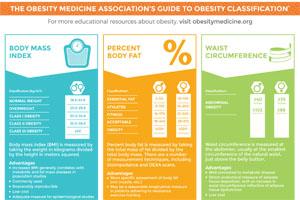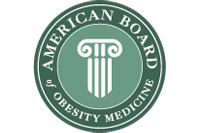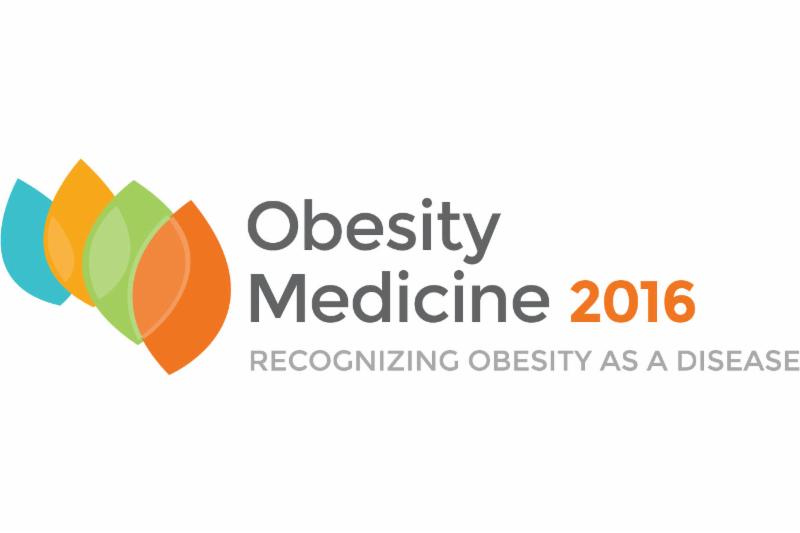
New and updated resources available
OMA committees have been working hard to provide new and updated resources to members in 2016. We're proud to announce the release of the revised obesity medicine office forms, which serve as a template set of forms for those starting an obesity medicine practice. We also developed a new poster that explains the three most commonly used methods of measuring obesity -- a great addition to patient exam rooms! As the year goes on, we plan to release an updated version of the Obesity Algorithm® and unveil a new learning management system, which will allow you to stream obesity medicine education online! |
Why certify in obesity medicine?
The American Board of Obesity Medicine (ABOM) released a new video this week answering the question, "why certify?" In the video, current Diplomates of ABOM explain the need for qualified obesity medicine specialists and why physicians should pursue certification through ABOM. Watch the video online now, and share it with your colleagues on your social media channels.
|

Members serve on ABOM board of directors
ABOM recently announced changes to its board of directors for 2016, which includes many members of OMA. Dr. Louis Aronne, who has been on the board of ABOM since its inception and also serves on the Obesity Treatment Foundation board of directors, transitioned into the role of chairman of the board of ABOM. Dr. Jenny Seger joined the board as a director this year. OMA members, Dr. Robert Huster and Dr. John Cleek, also serve on the ABOM board of directors. |
 HHS and USDA release new dietary guidelines
The Department of Health and Human Services (HHS) and the U.S. Department of Agriculture (USDA) released the 2015-2020 Dietary Guidelines for Americans, which will serve as an informational resource for the public, policymakers, and health professionals for the next five years. The recommendations fit into five overarching guidelines in the new edition:
- Follow a healthy eating pattern, including food and drink consumption, during your lifespan.
- Focus on variety, nutrient-dense foods, and amount of food.
- Limit calories from added sugars and saturated fats, and reduce sodium intake.
- Shift to healthier food and beverage choices.
- Support healthy eating patterns for all.
|
 |
Effect of caloric restriction or aerobic exercise training on peak oxygen consumption and quality of life in older patients with obesity and heart failure with preserved ejection fraction
Kitzman, D. W., et al. JAMA, 2016.
Heart failure with preserved ejection fraction (HFPEF) is a common form of heart failure and is related to high rates of morbidity, mortality, and health care costs. More than 80 percent of patients with HFPEF have excess weight or obesity. Patients with chronic HPPEF have exercise intolerance and reduced quality of life (QOL). A study was conducted to test if caloric restriction (diet) or aerobic exercise training (exercise) improved exercise capacity and QOL in older patients with obesity and HFPEF. The study found that exercise capacity increased significantly by both interventions, and the combination of diet and exercise had an additive effect. The change in exercise capacity was positively correlated with the change in percent lean body mass and the change in the thigh muscle to intermuscular fat ratio. Body weight decreased by 7 percent (7 kilograms) in the diet group, 3 percent (4 kilograms) in the exercise group, 10 percent (11 kilograms) in the exercise plus diet group, and 1 percent (1 kilogram) in the control group. Quality of life was not affected by any of the interventions. The authors concluded that exercise capacity can be improved with caloric restriction or aerobic exercise training in patients with HFPEF. View article
|
Effects of long-term treatment with testosterone on weight and waist size in 411 hypogonadal men with obesity classes I-III: Observational data from two registry studies
Saad, F., et al. Int J Obesity, 2016.
The effects of long-term use of testosterone (T) therapy for obesity has not been well studied. A retrospective study was conducted from two prospective, cumulative registry studies of 622 hypogonadal men, of which 411 men had obesity and hypogonadism (total T<12.1 nmol/L and symptoms measured by the Aging Males' symptoms scale). The minimum amount of treatment time was one year, and the average follow-up time for the analysis was six years. The study found that in all three classes of obesity, long-term T therapy produced significant weight loss and decreases in waist circumference and BMI. The authors concluded that T therapy is likely to be a safe and effective approach to achieve sustained weight loss in hypogonadal men with obesity. View article
|
|
|
*These events are hosted by organizations other than OMA. Contact the organization directly for details.
|
Use the member badge artwork to display your member pride on your website and in your email signature! Log in to get the code.
|
|
Executive Director
Sponsorships and Exhibits Manager
Operations Manager
Education Coordinator
Communication Manager
Executive Director of the Obesity Treatment Foundation
|
|
101 University Blvd.,
Suite 330
Denver, CO 80206
|
|
|
Long-term supplementation of green tea extract does not modify adiposity or bone mineral density in a randomized trial of postmenopausal women with overweight or obesity
Dostal, A. M., et al. Journal of Nutrition, 2016.
Green tea extract (GTE) is a popular supplement that people use to help with weight loss. GTE consumption improves adiposity and bone mineral density (BMD), although it is unknown if these effects are due to green tea catechins or the caffeine in the GTE. A study was conducted to test decaffeinated GTE on body composition and obesity-associated hormones. Participants consumed either a placebo or GTE containing 843 milograms (mg) (−)-epigallocatechin-3-gallate for 12 months. The study found that there were no significant differences in BMI, total fat mass, percent body fat, or BMD in the participants taking GTE compared to placebo. However, participants with higher baseline BMI who were in the GTE group had reduced tissue percent fat and gynoid percent fat to a greater extent than those in the placebo group. These findings suggest that, overall, decaffeinated GTE does not affect adiposity or BMD; however, it may provide modest improvements in tissue and gynoid adiposity in women with a high BMI. View article
|
 |

This spring we're headed to San Francisco for Obesity Medicine 2016, your leading resource for certification exam review and the premiere source of education about managing an obesity medicine clinic, nutrition, and the comprehensive approach to obesity treatment. Earn up to 30 CME/CE and attend the courses that most interest you!* |
Review Course for the ABOM Exam
13.25 CME/CE | April 6-7
Helps prepare those planning to take the American Board of Obesity Medicine (ABOM) certification exam.
| Practice Management Essentials
6.5 CME/CE | April 6
Explains the best business practices for running an obesity medicine clinic, from setting up a practice to boosting patient retention.
|
|
Nutrition Course
6.75 CME/CE | April 7
Outlines the latest evidence-based findings about nutrition and helps you select appropriate nutrition plans for your patients.
| Spring Obesity Summit
17 CME/CE | April 8-10
Addresses topics related to current and emerging research, evidence-based treatment approaches, technologies, and practical methods used by obesity medicine clinicians.
|
|
|
*The Review Course for the ABOM Exam runs concurrently with Practice Management Essentials on Wednesday and the Nutrition Course on Thursday. Registration for the Review Course includes two days of class time, and switching between courses is not allowed.
|
 This one-day course is worth up to 7 CME/CE hours and provides introductory-level training about the evaluation and treatment of patients affected by obesity. Refer a colleague to a course in their area and allow us to introduce them to obesity medicine -- you'll receive a $50 Amazon gift card for every attendee who lists you as their referring member! Learn more about this course. Course dates and cities:- Jan. 16 | Indianapolis
- Jan. 23 | New Orleans
- Jan. 30 | Philadelphia
- Feb. 20 | Raleigh
- Feb. 27 | San Diego
- July 16 | Houston
- July 30 | Minneapolis
- Aug. 13 | Orlando
|
|
|
|
The Obesity Medicine Association and the Obesity Treatment Foundation thank our 2016 Corporate Advisory Council members for their continuous support.
|
© 2016 Obesity Medicine Association. All rights reserved. Materials may not be reproduced, redistributed or translated without written permission. Advertising disclaimer: Under a policy approved by the OMA executive committee and exhibitor/advertiser review committee, commercial companies may apply to advertise in OMA publications. Approval does not imply endorsement or official recognition of particular products or services.
|
|
|
|